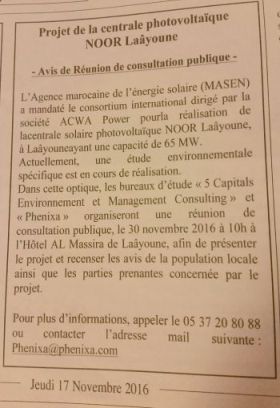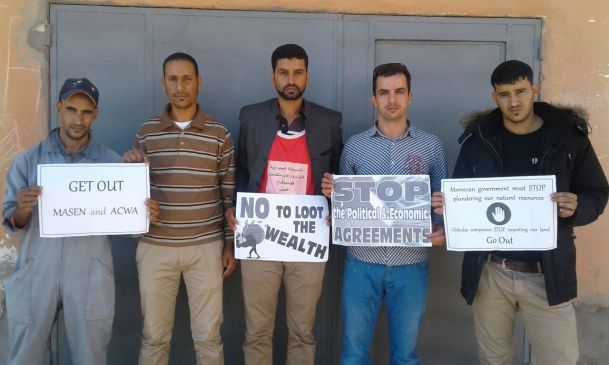Moroccan police today barred Saharawis from attending a "public consultation" organised by ACWA Power, contracted to construct the first solar plants in occupied Western Sahara.
"Moroccan plain-clothed police stopped us two streets away from the Al Massira hotel", says Mohamed, an activist of the coordination of families of Saharawi former Phosboucraa workers, and one of the Saharawis who had hoped to attend today's consultation meeting. "Many Saharawis wanted to attend, but we were all stopped. At least 15 people were stopped together with me".
Today's consultation meeting at the Al Massira is part of ACWA Power's social and environmental impact assessment. ACWA Power, a Saudi engineering company, was hired by the Moroccan Agency for Solar Power (MASEN) three weeks ago to develop 170 MW of solar capacity at three sites; Ouerzazate, El Aaiun and Boujdour. But the latter two are located outside of Morocco, and inside of Western Sahara, a Non-Self-Governing Territory that is largely under Moroccan military occupation since 1975. And the people of Western Sahara, either living as refugees in Algerian desert camps or under Morocco's iron fist, do not agree to their resources being exploited by the occupying regime.
"I wonder who they are consulting, if we - the Saharawis - are not allowed in the room", Mohamed says, touching upon the very core of the problem.

A UN Legal Opinion of 2002 is clear that the "wishes and the interests" of the Saharawi people are two essential requirements for any resource-related activity to be considered permitted under international law. The Saharawis have an internationally recognised right to self-determination; the right to determine the status of their land, and thus of its resources. The author of the UN Legal Opinion, the then UN Under-Secretary General for Legal Affairs, Hans Corell, has just recently stated that the "wishes and interests" criterion also applies to renewable resources.
WSRW is not aware of any Saharawi group having been contacted prior to the issuing of the contract to ACWA, nor any group having been invited to the hearing. A small notice (picture to the right) was published in a Moroccan newspaper on 17 November 2016. The notice or invitation seems not to be found anywhere online.
ACWA Power has hired 5 capitals, a Dubai-based consultancy firm, and Phénixa, a Moroccan consultancy firm, to under take its social and environmental impact assessment. As far as WSRW can tell, there is one more meeting planned in Boujdour, tomorrow 1 December, apart from today's meeting in El Aaiun.
In early November, the UN Human Rights Committee emphasized the importance of the Saharawi people's "prior, free and informed consent to the realization of developmental projects and [resource] extraction operations".
WSRW yesterday wrote to ACWA Power's CEO, Mr Paddy Padmanathan, asking what steps the firm had taken to obtain the express consent of the Saharawis to construct solar infrastructure in their homeland. The company has today acknowledged receipt of the letter, but did not yet reply on content.

Morocco allocates land in occupied Western Sahara to green hydrogen investors
Morocco’s ambitions to become a global green hydrogen powerhouse are accelerating. Yet, Rabat is allocating land in a territory it does not legally own.
US eyes minerals in occupied Western Sahara
Seeking to position itself as a key supplier of strategic minerals for Western powers, Morocco has signed a new agreement with the United States that covers Western Sahara’s waters and the critical minerals harboured there.
TAQA-Moeve obtains land in occupied Western Sahara
Morocco’s push for green hydrogen has taken a decisive step forward - on territory it does not legally own.
EU-Morocco Statement: autonomy without self-determination, law without lawfulness
A joint statement that came out of last week’s EU-Morocco Association Council asks readers to believe in a fiction: that an undefined autonomy plan imposed by an occupying power can satisfy the right to self-determination, and that respect for international law can coexist with the systematic ignoring of the EU’s own highest court.



